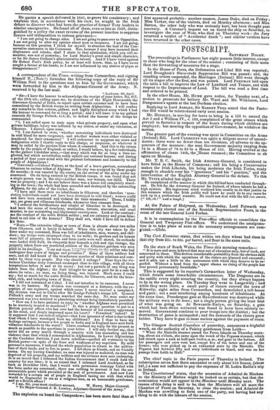POSTSCRIPT.
SATURDAY NIGHT.
The proceedings in Parliament last night possess little interest, except to those who long for the close of the session ; consisting of little more than the forwarding of measures for a stage.
In the House of Peers, the Defamation and Libel Bill was reported; Lord Brougham's Slave-trade Suppression Bill was passed ; and, the standing orders suspended, the Marriages (Ireland) Bill went through all its stages after the first, and was passed. Lord PORTMAN laid upon the table a bill to improve the Law of Landlord and Tenant, and with respect to the Improvement of Land. The bill was read a first time and ordered to be printed.
In the other House, Mr. HUME gave notice, for Tuesday next, of a motion to prosecute for bribery Mr. Ward and Mr. Wilkinson, Lord Dungannon's agents at the last Durham election.
Replying to Lord ASHLEY, Sir ROBERT PEEL stated that the Facto- ries Bill would be reintroduced early next session.
Mr. HINDLEY, in moving for leave to bring in a bill to amend the Act 3 and 4 William IV., c. 103, complained of the great abuses which prevail in factories in respect of the hours during which children are employed; but meeting the opposition of Government, he withdrew the motion.
The greater part of the evening was spent in Committee on the Arms (Ireland) Bill. Lord CLEMENTS was again a diligent mover of amend- ments : there were no fewer than ten divisions, all adverse to the op- ponents of the measure ; the neat Government majority ranging from 34 in a House of 78 to 83 in a House of 105. Having arrived at the affirmation of clause 54th, the :House resumed ; the Committee to sit again on Monday.
Mr. T. B. C. Smith, the Irish Attorney-General, is considered to have failed in the House of Commons ; and his being a Conservative makes the Irish Liberals, his being moderate the Irish Tories, ready enough to chuckle over his " ignorance" and his " position," and the intervention of the English Attorney-General in the debate. To this, Mr. TUITE alluded last night— He complained of the manner in which this bill had been conducted through- out. He felt for the Attorney-General for Ireland, of whose talents he had a. high opinion. His ingenuous mind rendered him unable to do that justice to this measure which the Irish public well knew he could do to any cause he took up in a professional manner. He could not deal with the bill con amore. (" Oh, oh 1 " and a laugh.)


























 Previous page
Previous page